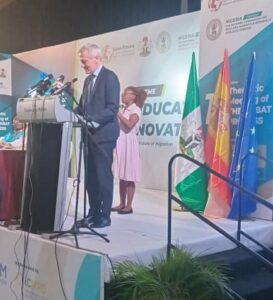By: Goodluck E. Adubazi, Abuja.
The Honourable Minister of Humanitarian Affairs and Poverty Reduction, Professor Nentawe Goshwe Yilwatda, has stated that the government under the Renewed Hope Agenda of President Bola Ahmed Tinubu is committed to addressing the issue of irregular migration in Nigeria.
Speaking on Tuesday, 13th May 2025, at the Transcorp Hilton Hotel, Abuja, during the two-day conference themed “First Thematic Meeting in Africa on Youth, Education and Innovation: Driving the Future of Migration,” Professor Yilwatda welcomed over 100 delegations from 57 African countries and beyond. The event, part of the Rabat Process Euro-African Dialogue on Migration and Development, runs from 13th to 14th May 2025.
The Minister stated, “We must be reminded today that over 80% of migration from Africa to Europe is regular, especially from Nigeria. Most migration from Nigeria is regular, and many African countries experience the same pattern. Only less than 20% is irregular, and that’s why we are here—to focus on the 20% that needs attention. Migration, when governed, is not a crisis. It contributes to development, bridges cultures, transfers labour, and builds resilience.”
He added, “Our mission must be to create a system that acknowledges this reality rather than distorts it. Over 60% of Nigeria’s population is under 25 years of age. These young men and women embody innovation, resilience, and leadership, yet many remain marginalized. We are determined to change this through initiatives such as the National Youth Investment Fund and the Empower Digital Skills for All Program.”
Professor Yilwatda further mentioned government efforts in technical and vocational education, stating, “We are bridging the gap between education, employment, and opportunity. Through the National Talent Export Program and increased investment in technical training, thousands of young Nigerians have been prepared for global competitiveness.”
On diaspora contributions, the Minister noted, “In 2022, Nigerians in the diaspora contributed \$219 billion in remittances. Beyond financial contributions, Nigerians abroad are leaders in technology, education, sports, and the creative industry. You can’t listen to music or watch football globally without seeing Nigerian influence. Our diaspora is deeply woven into our national identity as innovators and informal ambassadors.”

In his goodwill message, the Honourable Minister of Youth Development, Hon. Ayodele Olawande, appreciated delegates and thanked Professor Yilwatda for convening the conference. He emphasized youth inclusion, saying, “For the first time since 1999, Nigeria has a truly young Minister of Youth. President Tinubu understands the value of youth leading youth—people who know the issues firsthand.”
The Youth Minister highlighted youth resilience and innovation: “Nigerian youth excel in education, sports, agriculture, and technology. We are agile, formidable, and capable of contributing globally. The President is working tirelessly to create an enabling environment for youth to thrive. Every investment in education must come with innovation.”
A representative of the European Union summarized ongoing initiatives to promote legal migration pathways. These include the revised EU Blue Card and Single Permit Directives, the proposed EU Talent Pool, and talent partnerships with Tunisia, Morocco, Egypt, Bangladesh, and Pakistan. A future partnership with Nigeria is in discussion, alongside the EU-Nigeria Readmission Agreement.
The EU also emphasized the importance of avoiding brain drain and creating sustainable, large-scale programs involving multiple EU member states. It plans to introduce a new visa strategy to support skilled migration and student mobility while advancing economic cooperation and youth empowerment.
Foreign dignitaries including Ana Hernandez (Kingdom of Spain), the European Union, and the International Centre for Migration Policy Development (ICMPD) participated in the event. The Rabat Process, co-chaired by Nigeria and Spain, seeks sustainable alternatives to irregular migration, focusing on youth, diaspora engagement, and skill development.
Experts estimate that by 2030, 450 million people will enter the global labour market. With over 55% of Africa’s population under 20, and 75% of the world’s under-35 population residing in Africa, the continent must create 20 million jobs annually to meet demand, underscoring the need for coordinated migration, education, and innovation policies.